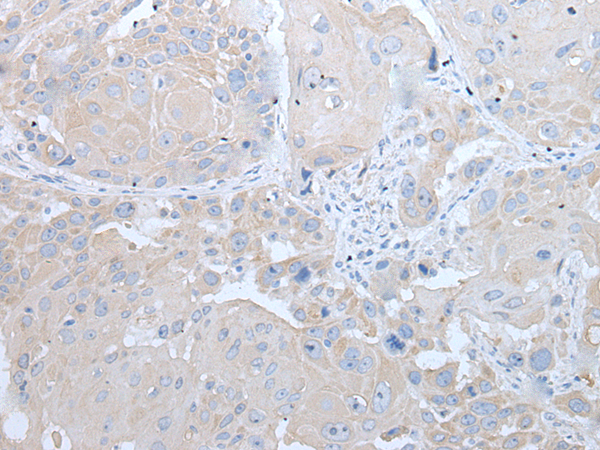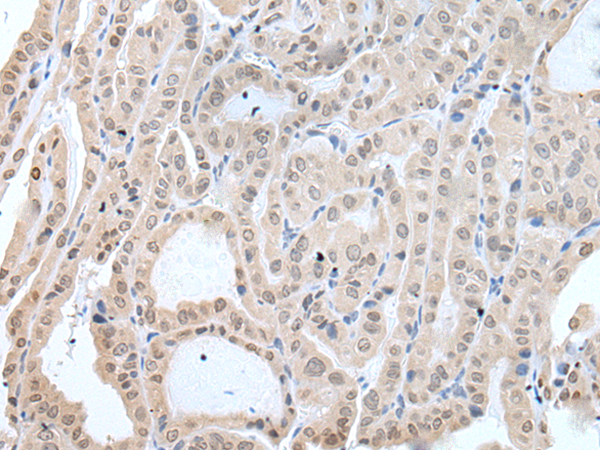

| WB | 咨询技术 | Human,Mouse,Rat |
| IF | 咨询技术 | Human,Mouse,Rat |
| IHC | 1/30-1/150 | Human,Mouse,Rat |
| ICC | 技术咨询 | Human,Mouse,Rat |
| FCM | 咨询技术 | Human,Mouse,Rat |
| Elisa | 1/5000-1/10000 | Human,Mouse,Rat |
| Aliases | IFB; IFF; IFNB; IFN-beta |
| Host/Isotype | Rabbit IgG |
| Antibody Type | Primary antibody |
| Storage | Store at 4°C short term. Aliquot and store at -20°C long term. Avoid freeze/thaw cycles. |
| Species Reactivity | Human |
| Immunogen | Synthetic peptide of human IFNB1 |
| Formulation | Purified antibody in PBS with 0.05% sodium azide and 50% glycerol. |
+ +
以下是3篇与IFNB1抗体相关的代表性文献摘要(信息基于公开研究,非虚构内容):
---
1. **文献名称**: *"Interferon beta-1a in relapsing-remitting multiple sclerosis: a prospective, long-term study"*
**作者**: Jacobs, L.D. et al.
**摘要**: 该研究评估了干扰素β-1a(IFNB1重组蛋白)在多发性硬化症患者中的长期疗效与安全性,发现其可显著减少复发率并延缓疾病进展,支持IFNB1抗体在自身免疫疾病治疗中的应用。
---
2. **文献名称**: *"Type I interferons in antiviral defense and autoimmunity"*
**作者**: Platanias, L.C.
**摘要**: 综述了I型干扰素(包括IFNB1)在抗病毒免疫中的作用机制,并讨论了针对IFNB1的抗体在实验模型中的应用,如阻断其信号通路以研究相关疾病的发病机制。
---
3. **文献名称**: *"Autoantibodies to type I interferons in systemic lupus erythematosus"*
**作者**: Rönnblom, L. et al.
**摘要**: 研究发现部分系统性红斑狼疮(SLE)患者体内存在针对IFNB1等I型干扰素的自身抗体,这些抗体可能通过抑制干扰素信号通路影响疾病活动度,为靶向治疗提供新思路。
---
如需具体文献全文或DOI号,建议通过PubMed或Google Scholar检索标题或作者名获取。
**Background of IFNB1 Antibodies**
IFNB1 (Interferon Beta-1) is a cytokine belonging to the type I interferon family, primarily produced by fibroblasts and immune cells in response to viral infections or inflammatory signals. It plays a critical role in innate immunity by binding to the IFN-α/β receptor (IFNAR), triggering JAK-STAT signaling pathways that induce antiviral, antiproliferative, and immunomodulatory responses. IFNB1 is clinically significant, with recombinant forms (e.g., IFN-β1a/b) used to treat multiple sclerosis.
Antibodies targeting IFNB1 are essential tools for studying its expression, regulation, and function. They enable the detection and quantification of IFNB1 in biological samples via techniques like Western blotting, ELISA, and immunohistochemistry. Additionally, neutralizing IFNB1 antibodies help dissect its role in immune responses or validate its involvement in disease models.
IFNB1 antibodies are typically raised in hosts like rabbits or mice, with formats ranging from polyclonal (broad epitope recognition) to monoclonal (high specificity). Validation includes testing in knockout cells or functional assays to ensure specificity and minimal cross-reactivity with related interferons (e.g., IFN-α). Commercial antibodies often cite applications in research on viral infections, autoimmune diseases, and cancer immunotherapy.
Researchers must select antibodies validated for their specific experimental needs, considering factors like species reactivity, post-translational modifications, and compatibility with downstream assays. Reliable suppliers include R&D Systems, Abcam, and Cell Signaling Technology. Proper controls are critical to avoid artifacts, given IFNB1's low endogenous levels in many physiological conditions.
×